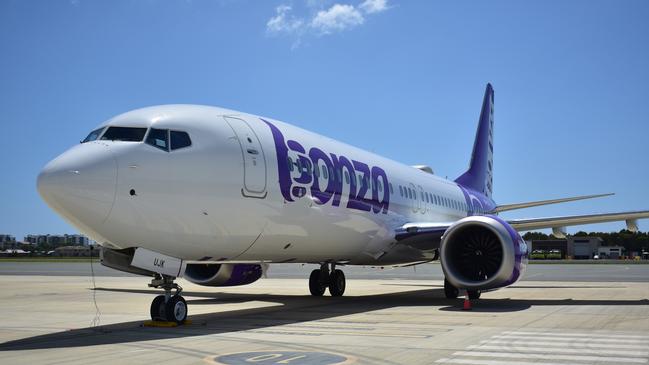777 Partners sued by payment provider Stripe over Bonza airline’s collapse and who owes what


The collapse of Bonza airlines is a gift that keeps giving to two groups of people – Qantas and Virgin executives, and the lawyers pursuing Bonza parent 777 Partners through the courts.
The ACCC detailed the benefits to the former on Tuesday, noting that the demise of Bonza (and semi-demise of Rex) had allowed Qantas subsidiary Jetstar to jack up pricing and fill extra seats after the return of its status as the country’s only domestic budget carrier.
As for the latter, global payments giant Stripe is the latest to try its luck in the courts against 777, joining the conga line of former business associates alleging dodgy and fraudulent dealings by the private investment company.
Stripe launched legal action in the US this week, claiming 777 ducked its obligations to provide a $14m guarantee to its Australian business arm, as part of a deal to ensure Stripe wasn’t left in the lurch if Bonza went bust.
When Bonza launched was in 2023, Stripe was the company that agreed to provide the back-end technology allowing the airline to process credit card payments – including for the 70,000 or so holiday-makers eventually left stranded by Bonza’s collapse last year.
A key risk for Stripe – and its Irish-born billionaire founders, Patrick and John Collison – is the predilection of customers to dispute their bills with Stripe clients and reverse credit card charges, landing the immediate cost on the payment services provider.
And even though Stripe is the payment processor of choice for many of Australia and Silicon Valley’s unicorn tech companies – think Canva, Atlassian, Shopify, Instacart, Uber and Zara – there’s always a need to reduce your risks when dealing with a start-up.
In this case it was a demand that Bonza front up a cash reserve to cover payment reversals if its payment provider got worried the airline’s business was in trouble.
That agreement wasn’t forthcoming from Bonza, according to court documents filed by Stripe in the US this week. Instead, 777 executive John Jeffrey suggested that another one of 777’s subsidiaries – Sutton Speciality Insurance – provide the guarantee instead.
Sure, said Stripe, after being assured that Jeffrey had the power and authority to sign the agreement on behalf of Sutton.
Then, of course, came Bonza’s collapse in April 2024. Which, unsurprisingly, triggered efforts by the 70,000 or so would-be passengers who had booked flights with Bonza to cancel their payments and get their money back; all in all it was potentially worth about $20m, according to court filings by Stripe.
Stripe, naturally, tried to call in its guarantee with Sutton. The response came a few weeks later, in May. We’re paraphrasing here, but it would best be characterised as “new phone, who dis?”
Or, in the language of lawyers: “Sutton stated, among other things, that it had no knowledge of the guarantee prior to May 13, 2024 and that Jeffrey was never authorised to issue the guarantee on Sutton’s behalf. It disclaimed any liability under the guarantee and characterised it as unenforceable”.
According to Stripe, credit care customers have already made some $3.1m in chargebacks on their credit cards – of which about $775,000 is yet to return to aggrieved customers “from any source”.
Claims are still flowing in, Stripe says, because you can’t cancel your credit card payment until after the plane was due to fly – even if you know it never will because, for example, the airline went bust a year ago.
Even though 777 agreed to hand over about $9.4m, without admitting the guarantee was real, that money dried up after only $2.7m was paid.
The sum in question is paltry for both companies, in the scheme of things. 777 is also facing a $US350m suit from its other lenders, who allege the company pledged assets it did not own, were already promised to someone else, or simply did not exist.
Stripe’s Australian arm booked revenue of $925.8m last year and, although it booked just $684,000 in net profit, it also sent $290.4m in “reseller fees” to its Irish parent company, so things can’t be that tough.
But it appears the Bonza loss still stings enough to take the matter to the US courts.





To join the conversation, please log in. Don't have an account? Register
Join the conversation, you are commenting as Logout